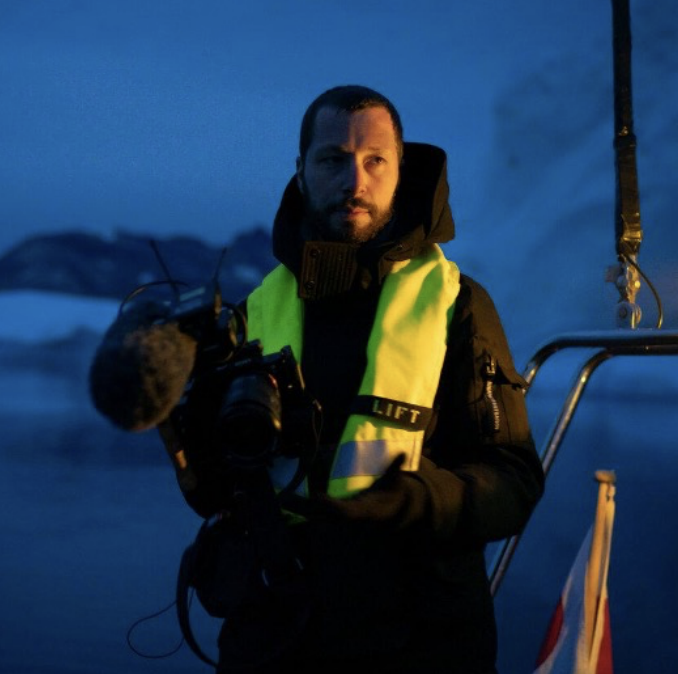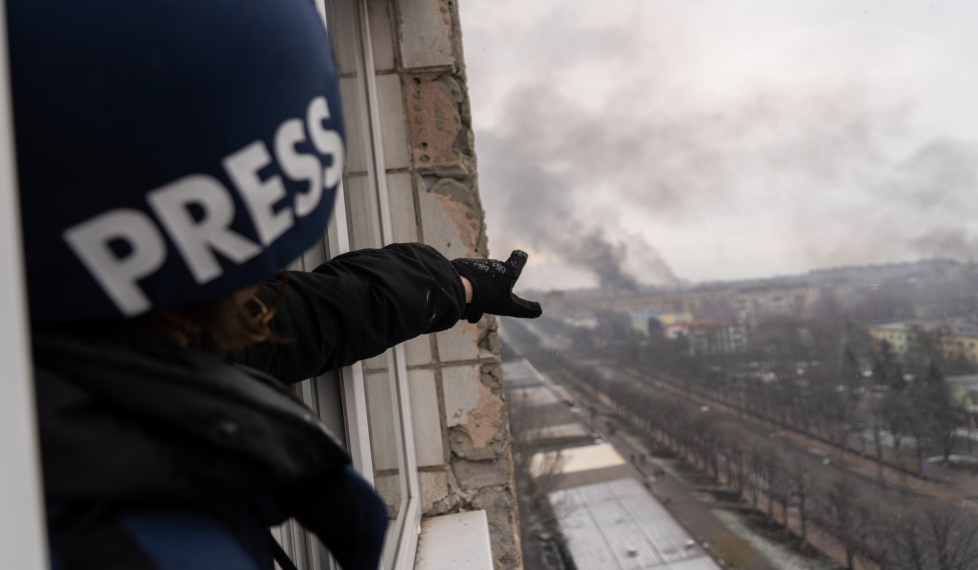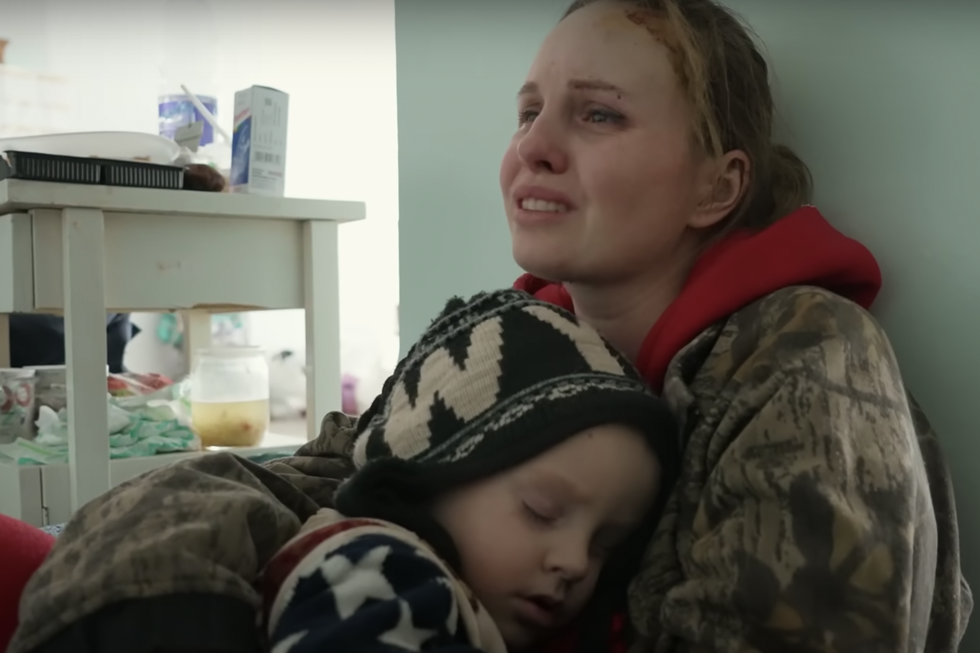Two years ago, on February 24, 2022, Russia invaded Mariupol, Ukraine. The siege was so quick—and the violence so indiscriminate—that only one video crew managed to get footage out of the city. Led by videographer and documentarian Mstyslav Chernov, a team of Associated Press journalists later put together video of their experience on the ground for a documentary titled 20 Days in Mariupol. The film, which debuted in August, has since been nominated for Best Documentary Feature at the upcoming Academy Awards. 20 Days is a harrowing story about a community that was completely transformed into a war zone in just a matter of days, trapped in a conflict that is still raging today.
“What you see on the screen is real,” Chernov tells Esquire. “It’s a symbol of what is still happening in other cities in Ukraine. It’s the pain and the tragedy of a civilian population caught up in war—and how unacceptable the war is. I don’t want to sound preachy—journalists should just keep reporting—but it’s hard not to be emotional when you’re representing people.”
Born in Kharkiv, Ukraine, Chernov has been filming from the frontlines of global conflicts since 2013. He’s been present for the war in Syria, the Battle of Mosul in Iraq, the 2015 European migrant crisis, and Ukraine’s ongoing war with Russia in the Eastern Donbas region. “Whenever I had the chance, I came back to Ukraine,” Chernov says. “I still feel like I didn’t do enough. We all didn’t do enough. That resulted in the world being shocked and surprised in 2022 when Russia escalated this conflict. But it happened, maybe, because there weren’t enough voices saying that war is happening. So, I dedicated myself to documentary filmmaking.”
In just the few days since we spoke, the conflict has once again reached a fever pitch.
Russian opposition leader Alexi Navalny reportedly died in a Siberian prison on February 16. Widely known as one of Vladimir Putin’s greatest political foes, Navalny was serving a 19-year sentence on charges of “extremism.” The circumstances surrounding his death led many reporters to speculate that his country killed him before the upcoming election in Russia. Now, the U.S. is planning major sanctions against Russia and greater aid for Ukraine as the conflict goes on. But as President Biden shifts focus to his own campaign for reelection, Ukrainian President Volodymyr Zelenskyy has stated that the delay for aid from the west has made their fight “very difficult.”
“The world keeps forgetting about Ukraine,” Chernov says. “Whenever the topic arises, it feels like it’s a political topic, but it’s a humanitarian issue. Civilians are being killed as politicians are having conversations. Half of the world is about to hold elections. And you will see more and more how Ukraine has become political. That’s a dangerous thing.”
Below, Chernov discusses what it was like on the ground in Mariupol during the invasion, how the war has changed two years later, and what he hopes audiences take away from his Oscar-nominated documentary.
ESQUIRE: I’d love to start with a question about you—and how you got into this job as an on-the-ground reporter for Associated Press. Although you’re running around and filming in Ukraine, not much is said in the documentary about who you are and why you’re there.
MSTYSLAV CHERNOV: That’s good, actually. There’s a reason why there is very little. Although it’s a personal story—I am telling the story of the community I live in—it’s not a story about me. It’s a story about the people of Mariupol, the city, how it got destroyed, and it’s a story about loss, courage, and hope. So, we were very careful to keep the perspective personal, but to not make the film about me.
The only reason why I was able to tell this story effectively—where the camera is still rolling in the most dangerous moments, and I’m still kind of in control—is because I’ve been doing this work since 2013 [right before Russia attacked Crimea], when reporters and documentary photographers were turned into war correspondents. We had to learn new things: how to give first aid and how to distinguish which kind of weapon is shooting at you. It was a survival crash course.
In 20 Days, you mention a meeting with your team, when you learned that Mariupol would presumably be one of the first targets. What was the mood in the room as you came to the decision to go to the city and film—knowing that it may become a battleground?
Our team was responsible for covering Donbas [the region in Eastern Ukraine that borders Russia some 400 miles west of Volgograd and is home to cities such as Donetsk and Mairupol]. We did it for years—and we know Donbas very well. We know Mariupol. We’ve reported from there since 2013. It was already very clear that it was a goal for Russia to take Mariupol. It was always a frontline city. You could always hear fighting from the trenches and people got used to that. It was a way into Crimea, and Russia stated that it wanted to occupy the whole of Donbas. We were watching Russian news, which is a great indicator of plans from Russia, and we were hearing from the army and fellow journalists. Logic told us there would be an attack.
Mariupol, in any case, would be a strategic target. Looking at the map, if Russian forces broke through—and if they're joined with the Russian forces in Crimea—they would surround the city and siege it. That meant that the decision to go the day before the invasion started would also be the decision to stay and keep reporting if the city was seized.
How did you learn that you were likely the only crew left in Mariupol?
Most of the journalists left for the battle in Kyiv. Not because they were afraid, but because they felt that it was more important. But as events unraveled and we continued to send reports, people kept telling us that we had to keep filming. It motivated us a lot. They told us, “Your images are the only ones that are coming out. Probably, you’re the only ones who are reporting from there.” That added a journalistic responsibility, but also a civil responsibility. We’re Ukrainians telling the story of our communities. It reinforced the need to continue until we didn’t have the means.
There’s a woman in the beginning of the documentary who is panicking in the streets—and you tell her to go back to the safety of her house. Later, you find her in a shelter after her home was hit by shelling. I imagine it was hard to see her again and apologise.
Yeah, it was hard. This was something that none of us had expected. We were afraid of it, but we didn’t expect it. The reason so many people remained in Mariupol was because they didn’t believe that the attacks would be so indiscriminate and violent. I saw examples of Aleppo, which was destroyed by Russian bombs. Grozny was levelled during Russian attacks in the Chechen war. So, we were afraid that this would happen in Mairupol. But, when a person panics in front of you, this isn’t someone far away. You feel like this is your neighbour. You try to calm them down and give advice. We didn’t know what was going to happen.
There are not many shots like that in the documentary, because in those 20 days we often dropped our cameras to hold gurneys and carry injured people. We were delivering food in hospitals when doctors were busy. We were helping medics evacuate injured civilians. But sometimes it’s really frustrating to have a camera. You can’t stop a bullet, or a shrapnel, or help bleeding. If a child dies, or if doctors fail, you’re just there with your camera filming—you can’t stop it. You send those images, against all the odds, and you expect something will change. But, of course, nothing changes. We did everything for the world to remember the tragedy of Mariupol as an example of what happens to cities when Russia sieges them. After Mariupol, Mar’inka [just south of Donetsk] was erased. Bakhmut [north of Donetsk] was destroyed and occupied. It’s hard.
Do you feel that the media has moved on to the conflict in Gaza and left Ukraine behind?
But the conflict in Israel and Gaza is also very important. Civilians are dying. A lot of journalistic resources should go to that, too. Coverage has shifted because we have limited resources. There aren’t that many people who can cover these wars professionally. People also have a limited capacity for tragedy. They’re trying to live their lives, and they’re being bombarded by tragedy. Two wars are a lot—I understand. But I can see how that is frustrating for Ukrainians.
Have you returned to the area since filming 20 Days?
Well, the city is occupied. There’s just no way to get close to that. It’s more than 100 kilometres [over 60 miles] into occupied territory. There’s no way to know what’s really happening there, because so many people who have Ukraine passports are afraid to talk to us in fear of persecution. They can’t leave the city if they don’t have Russian passports. So, they’re in the ghetto. Russians are overtaking houses. So, it’s classic colonial policy that Russia does now in Mariupol. We’ve returned to the frontlines when we can. I’ve spent a lot of time in the frontlines at Kharkiv, near my hometown. I keep trying.
Watch the Trailer for 20 Days in Mariupol
You said earlier that you still wish you could do even more, but have you been able to sit with the work you’ve done and feel a sense of pride?
I’m happy that Mariupol will never be just a word. Because of these awards, because it got recognised, these people will be real—not just pictures on a screen. They will be remembered. That’s what I owe to Mariupol and everyone who lost their lives or helped us to survive. So, every appreciation that I have is for them—for those that help me to continue to tell the story. But it’s still a bitter feeling. Because, yes, things got worse. It’s been 10 years, and there’s still very little justice to be found. More than 25,000 people lay in mass graves outside of Mariupol.
But there’s hope to be found and a purpose. Not much has changed, but the Green Corridor was found so civilians could leave. People would run to us because they saw press on our helmets and asked if our country still existed. When you see how society collapses without connection to news from the outside world, journalists and information become as necessary as food and water. It gives you hope in journalism and its power to connect people and give voices to people. I don’t think the doctors or the civilians who told me to keep filming thought that the world would mobilise forces and the UN would send airplanes and that everything would be fine tomorrow. But they felt that they had a voice, and that helped them to survive. When you’re not heard, when you’re ignored, that’s terrible. When you know that someone is listening, that gives you the energy to keep going.
20 Days in Mariupol is out now in select cinemas.
Josh Rosenberg is an Assistant Editor at Esquire, keeping a steady diet of one movie a day. His past work can be found at Spin, CBR, and on his personal blog at Roseandblog.com.















